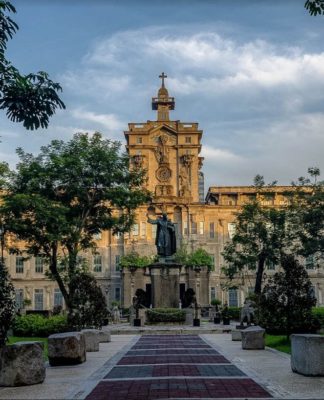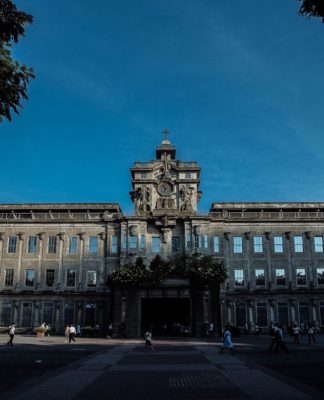STRUCK BY the brief Varsitarian update on the Magna Carta for UST Students in the June issue, the Central Board (CB), the legislative arm of the Central Student Council (CSC), has written a rejoinder, citing “factual errors and opinionated portions” in the report.
The letter was signed by 19 local council presidents and CSC head Reyner Villaseñor and was published by the Varsitarian in this issue virtually in toto in the mail section on the next page.
For its part, however, the Varsitarian would only own one unfortunate “mistake” as cited in the letter: the identification of the CB speaker and CB deputy speaker as “CBS president and CBS vice-president.” We apologize for the mistake. But the other points raised in the letter has to be clarified.
Concerning the report’s query on why the CB was reviewing the Magna Carta despite the approval by its predecessors, the question was valid inasmuch as the procedures for the passage of the Magna Carta had presumably been completed in the previous administration.
The Varsitarian has closely monitored the progress of the charter’s drafting and approval and when it made the June update, it had a whole history of reporting the process.
For example, in the V’s February 27, 2007 issue, then CB speaker Milfen Alvarado said that the Magna Carta had been “approved by the Office for Student Affairs (OSA)” and “would be passed to UST Rector Fr. Ernesto Arceo, O.P., who will then “meet with the Varsitarian, Board of Trustees, UST Faculty Union, Academic Senate, Board of Regents, and non-academic employees.”
Reviewing anew what has already been examined and commented upon by the OSA may mean that the CB lacks the procedural knowledge and skill in monitoring the charter’s progress. Moreover, the CB’s action appears to question the act of the previous boards that drafted and passed the charter. Additionally, it seems to question the OSA’s act of approving the charter last schoolyear.
As for the denial by CB deputy speaker Robby Rosales that he told the Varsitarian reporter that the Magna Carta was “with the Secretary General” and that “what he articulated was that the Magna Carta would be passed to the Rector for his comments,” the paper stands by its report.
The Rosales interview was conducted and recorded on tape by Special Reports writer Hershey Homol. Last July 19, in fact, the Accountancy student council president and a stenographer went to the Varsitarian office and listened repeatedly to the taped conversation.
Asked what stage the Magna Carta had reached thus far, Rosales said in the taped interview that the charter was already with the Office of Secretary General Fr. Isidro Abaño, O.P., for comments, based on what CSC president Villaseñor had told him. The crucial passage: “… ang latest update as of now sabi sa’kin ni Ney (Villaseñor) nasa Sec-Gen na for comments…”
It’s all there in the tape.
The next point raised by the CB and CSC is a rather revealing issue on the “student leaders” being cited by the Varsitarian report as having raised concern about the sequence of ratification, especially since a referendum after the Rector’s signing the charter might result in a “potentially embarrassing” situation for the Rector should the studentry reject the charter signed by him.
Rosales and Trinidad said they “never conveyed directly or indirectly, the above statement.”
The issue is related to the next point raised by the letter about the article’s citing of “student leaders” who had reportedly raised concerns that “the charter, as it exists now, is half-baked, with student participation left out of other areas of campus management, such as the recognition of student organization and even parking and food services . . . even students are left out of the formulation of rules and student assemblies.”
The CSC, CB and student council president said that as “student leaders,” they had never raised those issues.
But as we have said at the start of this column, the Varsitarian has been reporting on the Magna Carta all along and in fact, in a report last summer, it cited the concerns raised by some campus leaders about the stages of ratifying the charter as well as perceptions that the charter, as it stands now, seems half-baked since while it provides student participation in academic councils, it is mum on extra-academic issues, such as recognition of student organizations, campus parking, student health services, registrar services, food sevices, etc.
Moreover, the CB is not the alpha and the omega of student leadership in the University. Even leaders of campus organizations and student societies are “student leaders” and they should be consulted on the form, content and process of the Magna Carta.
Essentially, the Varsitarian views “student participation” and “student democracy” along more democratized lines. According to the CB, the CB members and local student council officers were elected by the studentry of the University to represent them in policy-making involving their rights and welfare. But the CB should also consider that in a representative democracy, they are required to empower their constituency by consulting them regularly in public forums.
For student leadership to subject itself to what Habermas called as the “public sphere” is also one way of cultivating transparency and enriching public knowledge.
But it seems that discussions about the Magna Carta have been limited only to the executive board of local student councils. The CB tends to circumscribe the Magna Carta debate to a one-way street. What about the interest of the other student organizations which also have their own constituencies? Are “pluralism” or “organizational ecumenism” alien to student democracy in UST?
And before anything else, where’s the text of the Magna Carta? Has it been circulated to the studentry so as to get their feedback? As far as we know, there’s no official text of the charter. As far as we know, what exists is a “phantom” Magna Carta. Where’s “student participation” or “student democracy” in all of this?

















